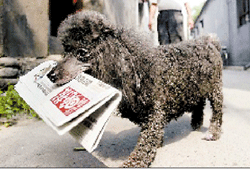do dogs think? (6)
By liuyinlong
@liuyinlong (8)
China
December 21, 2006 6:50am CST
The creature in the household with the most to lose from a new arrival, he probably simply fought for what he had. Then, once aroused, he was more dangerous. As trainers know, dogs under pressure have two options: fight or flight. Rocket decided to fight and paid for it with his life. Had his owner known more about dogs' true nature, he might have introduced the new dog more gradually, or not at all. And there might be one less bitten child. But this is all a guess. We will never know.
When I face such training problems—and I do, we all do—I try to adopt a Sherlock Holmesian strategy, using logic and determination. We have all sorts of tools at our disposal that dogs don't have. We control every aspect of their lives, from food to shelter to play, so we ought to be able to figure out what's driving the dog and come up with an individually tailored approach that works—and if it doesn't, come up with another one.
Why will Clementine come instantly if she's looking at me, but not if she's sniffing deer droppings? Is it because she's being stubborn or, as many people tell me, going through "adolescence"? Or because, when following her keen predatory instincts, she simply doesn't hear me? Should my response be to tug at her leash or yell? Maybe I should be sure we've established eye contact before I give her a command, or better yet, offer a liver treat as an alternative to whatever's distracting her. But how do I establish eye contact when her nose is buried? Can I cluck or bark? Use a whistle or hoot like an owl?
I've found that coughing, of all things, fascinates her, catches her attention, and makes her head swivel, after which she responds. If you walk with us, you will hear me clearing my throat repeatedly. What can I say? It works. She looks at me, comes to me, gets rewarded.
The reality is, we don't know that much about what dogs think, because they can't tell us. Behaviorists tend to believe that dogs "think" in their own way—in sensory images involving their finely honed instincts. They're not capable of deviousness or spite. They love routine: Nothing seems to make them more comfortable than doing the same thing at the same time in the familiar way, day after day: We snack here, we poop there, we play over here. I am astonished at how little it takes to please them, how simple their lives can be if we don't complicate them.
(to be continued)
No responses




